Donald Trump questions election integrity as he’s renominated

Trump, who was not scheduled to deliver his keynote convention address until later in the week, nevertheless made multiple public appearances throughout the first day of the four-day convention.
Congress stalls on policing overhaul, despite public outcry

The standoff threatens to turn the nationwide protests over the deaths of George Floyd, Breonna Taylor and others into another moment that galvanizes the nation but leaves lawmakers unable to act.
Senate GOP seeks policing changes, Democrats push for more
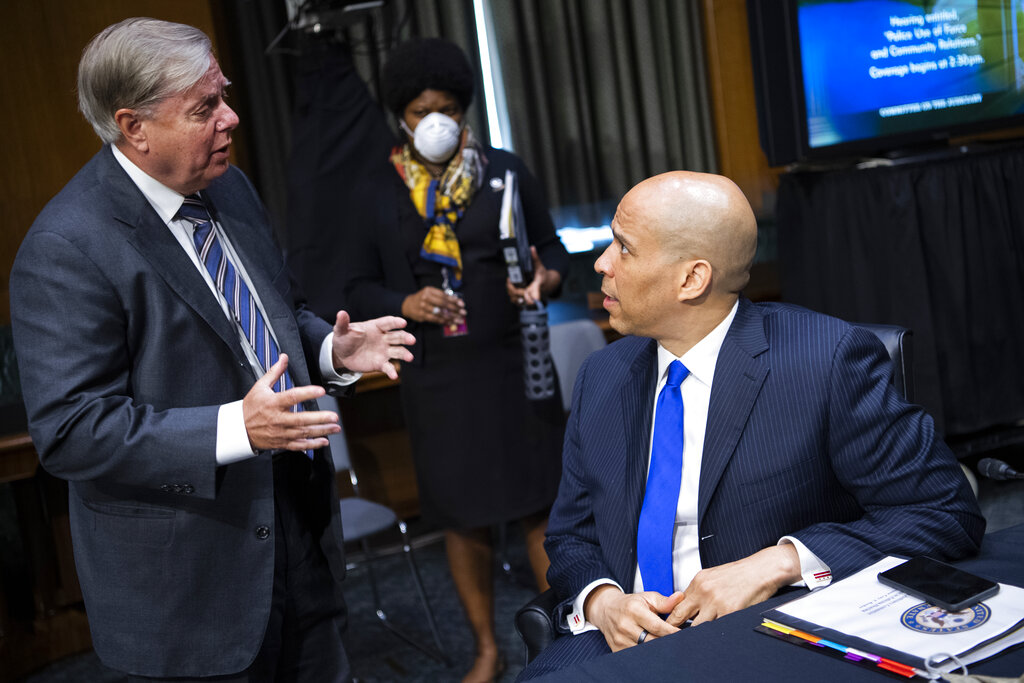
Two proposals are on a collision course as Congress seeks to show voters it hears the demonstrators marching in the streets.
Donald Trump signs order on police reform, doesn’t mention racism
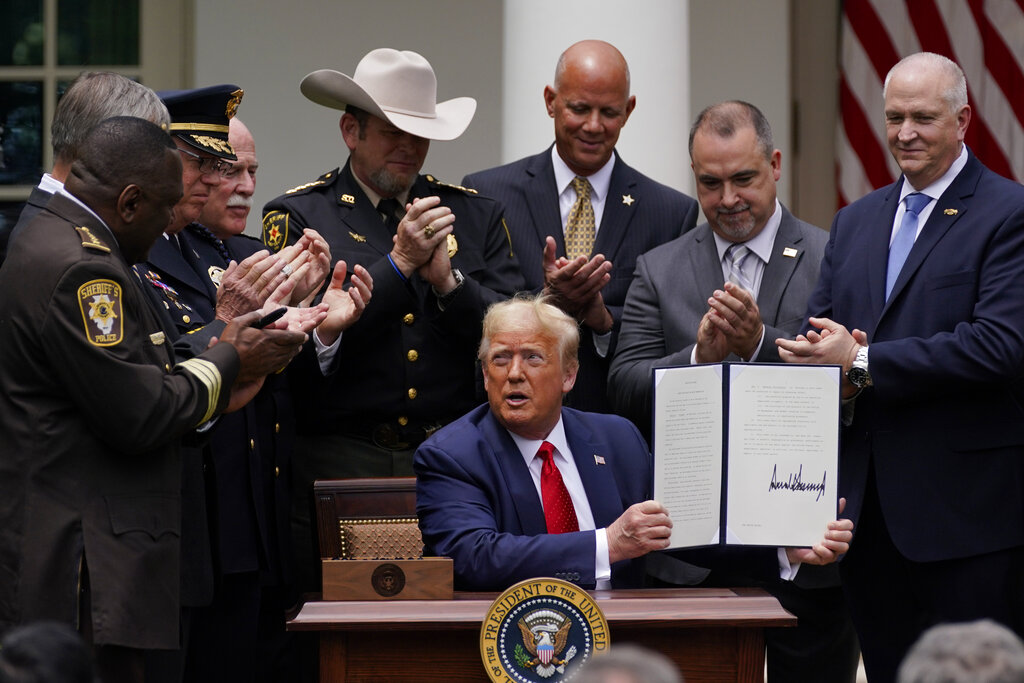
The order gives police departments a financial incentive to adopt best practices and encourage co-responder programs.
Donald Trump cheered loudly at college football national championship game
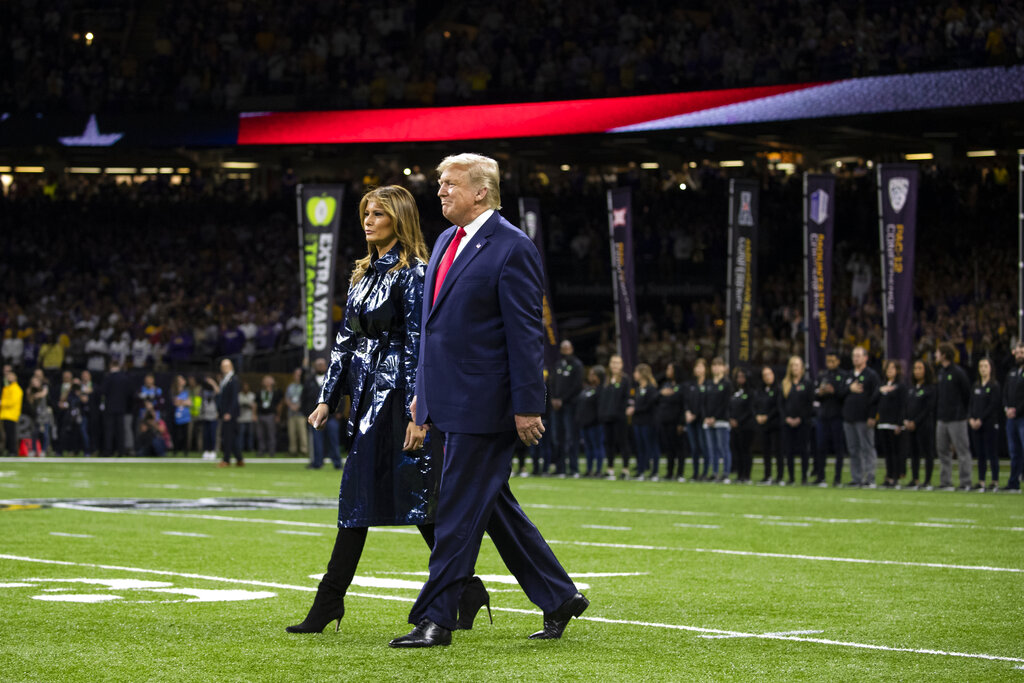
Donald Trump was warmly welcomed at the LSU-Alabama game earlier this year.
GOP lawmakers floated for Trump’s Supreme Court opening

As President Donald Trump considers his next Supreme Court pick, some Republicans in Congress want him to consider pulling from their ranks on Capitol Hill. GOP Sen. Ted Cruz of Texas suggests his conservative ally, Sen. Mike Lee of Utah, would be “the single best choice” Trump could make to fill the vacancy. Republican Sen. Tim Scott is making a pitch for his best friend in Congress, Rep. Trey Gowdy, a fellow South Carolinian. “I hope that the president will be open to that,” Scott said on CNN. Nominating a lawmaker and seeing him or her confirmed would be unusual. A veteran of either the House or the Senate hasn’t joined the court for nearly 70 years. Only a couple dozen members of Congress also served on the court in its history. But for now, only one lawmaker — Lee — is on the list of 25 names Trump is working from to fill the seat of retiring Justice Anthony Kennedy. Cruz says unlike other Republican nominees who have proven to be liberal “train wrecks,” he’s confident Lee, among his favorite colleagues in the Senate, “would be faithful to the Constitution and the Bill of Rights.” Lee is also staunchly opposed to abortion. But even though Lee is championed by conservatives as a strict constitutionalist, he could face obstacles to winning the president’s favor. Chief among them is that he never backed Trump for president during the 2016 campaign. There have been no indications from the White House that Lee is among the handful of top names receiving serious consideration. The same goes for his brother, the Utah Supreme Court justice Thomas Lee, who was also on Trump’s initial list of possible court nominees. Trump on Monday interviewed four prospective nominees for the court and said he expected to speak with a few more. The White House did not provide their names. The president said the candidates he met with are “outstanding people and they are really incredible people in so many different ways, academically and in every other way.” Sen. Lee’s office would not say if he was among the candidates who met with the president. Nevertheless, Lee, who started watching court proceedings on TV as a 10-year old and went on to clerk for Justice Samuel A. Alito, has made clear he wouldn’t dismiss an overture to join the court. “If somebody asked me if I would consider that, I would not say no,” he said. Trump plans to announce his nominee on July 9. The quick timetable could help Senate Republicans confirm a justice before the court’s term begins in October. While Lee has been floated as a nominee for some time, the same cannot be said for Gowdy, who is chairman of the House Oversight Committee. Scott, in making the case for Gowdy, said the former prosecutor is so fair that he has angered both Democrats and Republicans. “A guy who will call balls and strikes and not choose a side, even when he’s an elected member at this time in our nation’s history, that’s hard to find,” Scott said. Scott and Gowdy are close friends who have dinner together several nights a week. They also wrote a book about their friendship, “Unified,” that was released earlier this year. Gowdy led the congressional investigation into Hillary Clinton’s handling of the Benghazi attack in Libya and more recently distanced himself from Trump’s characterization of the Russia probe into election interference as “spygate.” Fellow lawmakers are rooting for their Capitol Hill colleagues. Sen. Marco Rubio, R-Fla., told reporters last week he was personally hoping Trump chooses Lee. “He’d be great,” Rubio said. Republished with the permission of the Associated Press.
The end of an era? Tea party class of House Republicans fades
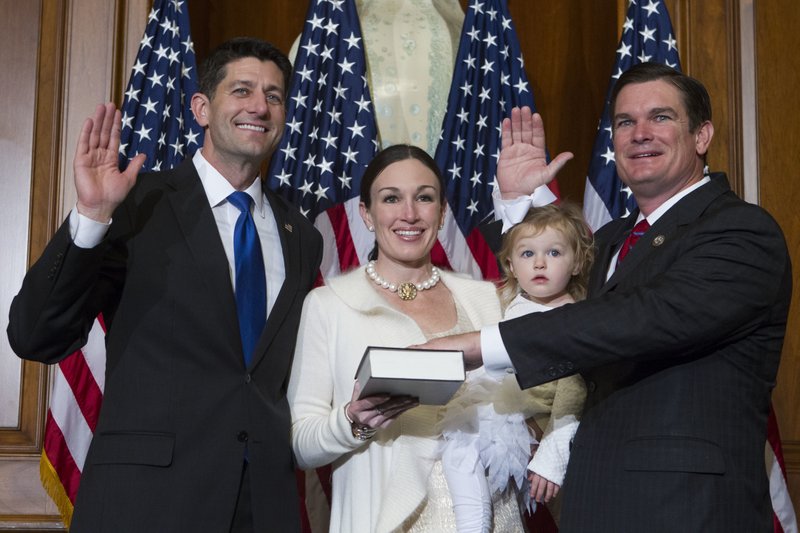
The Republican newcomers stunned Washington back in 2010 when they seized the House majority with bold promises to cut taxes and spending and to roll back what many viewed as Barack Obama’s presidential overreach. But don’t call them tea party Republicans any more. Eight years later, the House Tea Party Caucus is long gone. So, too, are almost half the 87 new House Republicans elected in the biggest GOP wave since the 1920s. Some, including current Secretary of State Mike Pompeo and White House budget director Mick Mulvaney, joined the executive branch. Others slipped back to private life. Several are senators. Now, with control of the House again at stake this fall and just three dozen of them seeking re-election, the tea party revolt shows the limits of riding a campaign wave into the reality of governing. Rep. Austin Scott, R-Ga., who was president of that freshman class, objects to the tea party brand that he says was slapped on the group by the media and the Obama administration. It’s a label some lawmakers now would rather forget. “We weren’t who you all said we were,” Scott said. He prefers to call it the class of “small-business owners” or those who wanted to “stop the growth of the federal government.” Despite all those yellow “Don’t Tread on Me” flags and anti-Obama health law rallies, Scott said the new Republican lawmakers wanted to work with the president, if only Obama would have engaged them. “We didn’t come to take over the country,” he said. Yet change Washington they did, with a hard-charging, often unruly governing style that bucked convention, toppled GOP leaders and in many ways set the stage for the rise of Donald Trump. By some measures, the tea party Republicans have been successful. The “Pledge to America,” a 21-page manifesto drafted by House Republican leadership, outlined the promises. Among them: “stop out of control spending,” ″reform Congress” and “end economic uncertainty.” They forced Congress into making drastic spending cuts, in part by threatening to default on the nation’s debt, turning a once-routine vote to raise the U.S. borrowing limit into a cudgel during the annual budget fights. Republicans halted environmental, consumer and workplace protection rules, and that rollback continues today. Perhaps most notably, the GOP majority passed $1.5 trillion in tax cuts that Trump signed into law, delivering on the tea party slogan penned on so many protest signs: “Taxed Enough Already.” But former Rep. Tim Huelskamp, R-Kan., said the “most egregious failure” was the GOP’s inability to undo the Affordable Care Act, Obama’s signature domestic achievement. Huelskamp said the class never really stuck together. When he arrived that first week in Washington in January 2011, he was stunned to find the leadership slate already set with then-Rep. John Boehner, R-Ohio, as speaker-in-waiting, facing little resistance. “That was a sign: The establishment in Washington was happy to have our votes, but not to follow our agenda,” said Huelskamp, who lost a primary election in 2016 to a political newcomer and now runs the conservative Heartland Institute. It was “just a clear misunderstanding of what the people wanted.” Over time, budget deals were struck with Democrats, boosting spending back to almost what it was before the revolt. Combined with the tax package, the GOP-led Congress is on track to push annual deficits near $1 trillion next year, as high as during the early years of the Obama administration when the government struggled with a deep recession. Maya MacGuineas, president at the Committee for a Responsible Federal Budget, said Republicans talked a good game promising to balance the budget, but with control of Congress — and now the White House — they failed to tackle the tough tax-and-spending challenges needed to get there. “That’s a whole lot of talk and zero follow through,” she said. Other proposals to improve transparency in government — a pledge to “read the bill” and post legislation three days before votes — remain works in progress. House bills are typically made public, but sometimes just before midnight to conform with the three-day rule. Frustrations within the ranks grew, and the new class splintered. Not all of them had been favorites of their local tea party groups. Some joined other conservatives to form the House Freedom Caucus, which nudged Boehner to early retirement in 2015. Former Florida Rep. Allen West, among the more prominent class members who lost re-election and is now a Fox News contributor living in Texas, said the challenge for House Republicans heading into the fall election is, “Who are they? What do they stand for?” House Republicans are wrestling with a midterm message at a pivotal moment for a party that Boehner says no longer exists. “There is no Republican Party. There’s Trump’s party,” Boehner said at a recent policy conference in Michigan. Boehner’s successor as speaker, Rep. Paul Ryan, R-Wis., also is stepping aside. He was a conservative up-and-comer long before the tea party, but has run into many of the same challenges Boehner faced in managing a fractured majority. He will retire after this term. In fact, there are an unusually high number of House Republicans retiring this year, including nearly a dozen from the tea party class. Several are running to be governors or senators, though some have already lost in primaries. Others, including Rep. Trey Gowdy, R-S.C., another rising star, are simply moving on. Some resigned this year amid ethics scandals. Jenny Beth Martin, a co-founder of Tea Party Patriots, says every movement “goes through phases.” As the group looks to elect the next “Tea Party 100″ members of the House, it’s seeking “tested and proven” candidates beyond the “citizen legislators” who powered the early days. Another 2010 leader, South Carolina’s Tim Scott, now a senator, says he has no problem with the tea party label that’s now etched in history. But he reminds his colleagues as they campaign that to keep the majority they must also eventually govern and that “promises made should be promises kept.” Republished
Tim Scott admonishes Donald Trump to be more careful on racial matters
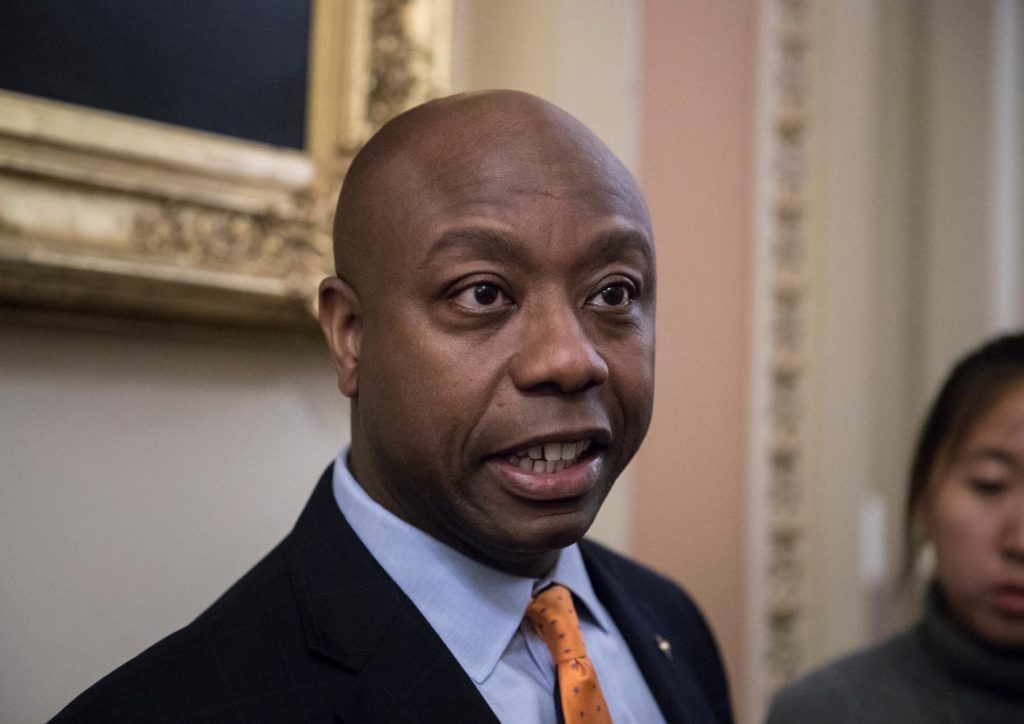
The Senate’s lone black Republican urged President Donald Trump on Wednesday to avoid inflammatory racial rhetoric such as his statement blaming “many sides” for the violence at a recent white nationalist protest in Virginia. Sen. Tim Scott of South Carolina said he met for roughly a half hour with Trump and Vice President Mike Pence at the White House. He said the president tried to explain his comment, and why he said there were “very fine people” among the nationalists and neo-Nazis protesting the possible removal of a Confederate statue in Charlottesville, Virginia, last month. “We had three or four centuries of rape, murder and death brought at the hands of the (Ku Klux Klan) and those who believe in a superior race,” Scott told reporters later at the Capitol. “I wanted to make sure we were clear on the delineation between who’s on which side in the history of the nation.” In a subsequent news release, the White House misidentified Scott in a photo caption by calling him “Senator Tom Scott.” Scott bluntly criticized Trump for assigning blame in a way that put white supremacist protesters on equal footing with counterdemonstrators who turned out for the Aug. 12 protests, sparked by Charlottesville officials’ decision to remove a statue of Confederate Gen. Robert E. Lee. That remark, Scott said, compromised Trump’s moral authority as president. On Wednesday, Trump told Scott that he just meant to convey “that there was an antagonist on the other side” – to which Scott replied, “The real picture has nothing to do with who is on the other side.” Scott continued: “I shared my thoughts of the last three centuries of challenges from white supremacists, white nationalists, KKK, neo-Nazis, so there is no way to find an equilibrium when you have three centuries of history.” The president said that he got the point, Scott said. Asked if the president can regain his moral authority, Scott responded, “That will take time.” White House spokeswoman Sarah Huckabee Sanders said Trump and Scott had an “in depth” discussion about the Charlottesville comments, “but the focus was primarily on solutions moving forward.” “That was what both people came to the meeting wanting to discuss,” Sanders said during a White House briefing. “What we can do to bring people together, not talk about divisions within the country.” Scott said Trump also brought up Seattle Seahawks defensive end Michael Bennett, who has accused Las Vegas police of using racially motivated excessive force against him. Bennett sat on the bench during the national anthem before Sunday’s game at Green Bay, one of several NFL players protesting in support of former NFL quarterback Colin Kaepernick, who remains unsigned after starting the protests last year to bring attention to police brutality against minorities. “I believe he found it unsettling and challenging,” Scott said. This came as several athletes, activists and celebrities signed a letter of support for Bennett. “Michael Bennett has been sitting during the anthem precisely to raise these issues of racist injustice that are now an intimate part of his life. Now we stand with him,” the letter said. It was signed by Kaepernick; tennis legend Martina Navratilova; academic Cornel West; John Carlos, a U.S. Olympic champion who famously raised his black-gloved fist during a 1968 medal ceremony, and other athletes and activists. Republished with permission from the Associated Press.
Senate confirms Alex Acosta as Donald Trump’s secretary of labor
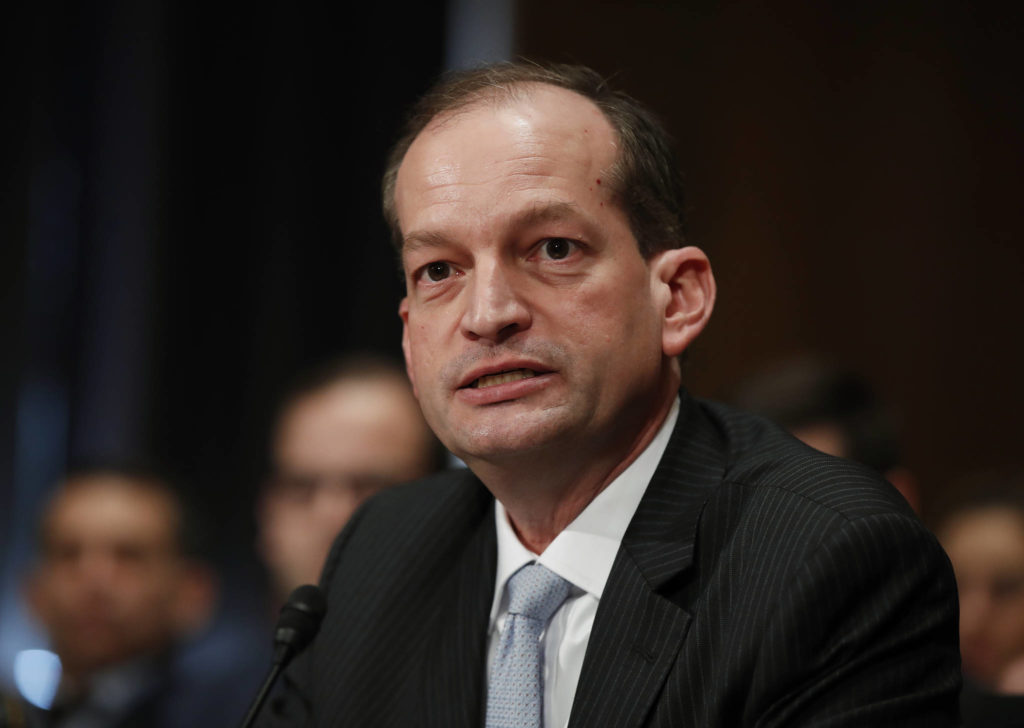
The Senate on Thursday confirmed Alex Acosta as Labor secretary, filling out President Donald Trump‘s Cabinet as he approaches his 100th day in office. The 60-38 vote confirms Acosta to the post. Once sworn as the nation’s 27th Labor secretary, the son of Cuban immigrants will lead a sprawling agency that enforces more than 180 federal laws covering about 10 million employers and 125 million workers. Sen. Tim Scott, R-S.C., spoke for many Republicans with a statement issued just after the vote saying he hopes Acosta’s focus will be “promoting labor policies that are free of unnecessarily burdensome federal regulations.” Scott said he wants Acosta to permanently revoke rules governing financial advisers and adding Americans eligible for overtime pay. Democrats said any Labor secretary should advocate for the American workers to whom Trump promised so much during his upstart presidential campaign. They said Acosta has given no such commitment. “Acosta failed this basic test,” tweeted Sen. Elizabeth Warren, D-Mass. Acosta has been a federal prosecutor, a civil rights chief at the Justice Department and a member of the National Labor Relations Board. He will arrive at the top post with relatively little clear record on some of the top issues facing the administration over key pocketbook issues, such as whether to expand the pool of American workers eligible for overtime pay. Acosta wasn’t Trump’s first choice for the job. Former fast food CEO Andrew Puzder withdrew his name from consideration last month, on the eve of his confirmation vote, after becoming a political headache for the new administration. Puzder acknowledged having hired a housekeeper not authorized to work in the U.S. and paying the related taxes years later — after Trump nominated him — and came under fire from Democrats for other issues related to his company and his private life. Acosta’s ascension would come at a key moment for Trump, just two days before he reaches the symbolic, 100-day marker. The White House has sought to cross the threshold with its own list of Trump’s accomplishments. Trump can say the Acosta vote was bipartisan, because eight Democrats and one independent voted yes. Joining the Republicans in his favor were Democratic Sens. Catherine Cortez Masto of Nevada, Heidi Heitkamp of North Dakota, Joe Manchin of West Virginia, Claire McCaskill of Missouri, Bob Menendez of New Jersey, Bill Nelson of Florida, Jon Tester of Montana and Mark Warner of Virginia. Independent Sen. Angus King of Maine also voted for Acosta. Labor secretary is the last Cabinet post for Trump to fill. Trump’s choice for U.S. trade representative, a job considered Cabinet-level, is awaiting a Senate vote. From the beginning, Acosta’s was a quiet march to confirmation that stood out because it didn’t attract the deep partisan battles faced by some of Trump’s other nominees, including Education Secretary Betsy DeVos and Secretary of State Rex Tillerson. Justice Neil Gorsuch‘s nomination provoked such a fight that majority Senate Republicans used the “nuclear option” to remove the 60-vote filibuster barrier for Supreme Court picks. Thursday’s vote marks the fourth time Acosta has been confirmed for the Senate. Democrats and most labor groups were mostly muted in their response to Acosta’s nomination. At his confirmation hearing, Democratic Sens. Patty Murray of Washington and Warren hammered Acosta for answers on a selection of issues important to labor and whether Acosta would cave to political pressure from Trump. Acosta refused to answer the policy questions until he’s confirmed, and he vowed to be an independent and fair voice for workers. Both senators said they had great concerns, and both voted no. Our standard can’t be ‘not Puzder,’” Murray said Wednesday on the Senate floor. But tellingly, even as Acosta’s nomination wound through the Senate, Democrats and their allies also tried to move on to other, labor-related issues — namely, a minimum wage hike to $15 an hour, which Trump opposes. Meanwhile, the Labor Department’s online landing page bears a glimpse of Acosta’s policy priorities: “Buy American, Hire American.” That’s the title of Trump’s executive order this week directing the secretaries of labor and other agencies to issue guidance within 60 days on policies that would “ensure that, to the extent permitted by law” federal aid “maximize the use of materials produced in the United States, including manufactured products; components of manufactured products; and materials such as steel, iron, aluminum, and cement.” Republished with permission of The Associated Press.
Koch network refusing to help Donald Trump
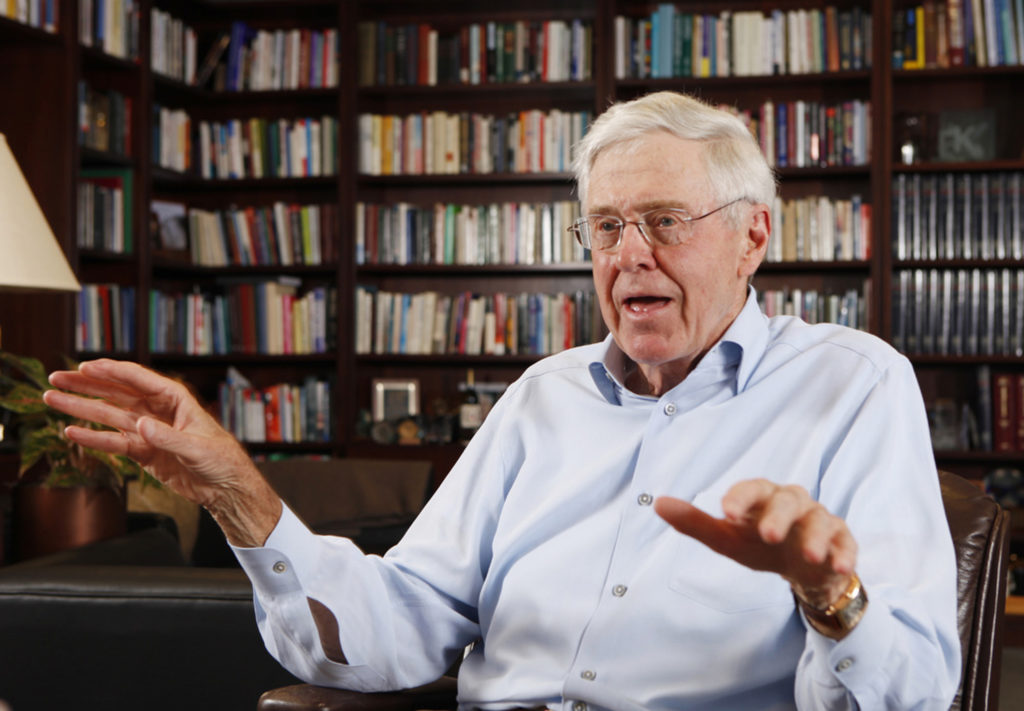
From a luxury hotel on the edge of the Rocky Mountains, some of the nation’s most powerful Republican donors are rebelling against Donald Trump. Billionaire industrialist Charles Koch, host of the exclusive weekend retreat, did not mention Trump by name as warned that political leaders are giving “frightening” answers to America’s challenges. One of his chief lieutenants was more direct as he made clear that Koch’s expansive political network would not use its tremendous resources to help Trump win this fall. “We’re focused on the Senate,” said Mark Holden, general counsel and senior vice president of Koch Industries. He noted that none of the presidential candidates are aligned with the Koch network “from a values, and beliefs and policy perspective.” Trump’s dire warnings of growing crime in America, Holden said, simply aren’t accurate. “We’re much safer,” Holden said. “That’s what the data shows.” Koch described the 2016 “political situation” this way: “We don’t really, in some cases, don’t really have good options.” The comments came Saturday, the first of a three-day gathering for donors who promise to give at least $100,000 each year to the various groups backed by the Koch brothers’ Freedom Partners — a network of education, policy and political entities that aim to promote a smaller, less intrusive government. The ambitious Koch network has invested hundreds of millions of dollars to influence politics and public policy over the last decade, but don’t plan to spend anything to help Trump, even if some of the 400 or so deep-pocketed donors gathered in Colorado Springs this weekend think it should. Trump thumbed his nose at the gathering from Twitter. “I turned down a meeting with Charles and David Koch,” the New York billionaire tweeted. “Much better for them to meet with the puppets of politics, they will do much better!” The weekend’s agenda for the estimated 400 donors gathered in Colorado Springs featured a series of policy discussions and appearances from at least three governors, four senators and four members of the House of Representatives, including House Speaker Paul Ryan. Kentucky Gov. Matt Bevin and Arizona Gov. Doug Ducey talked up policy successes in their states on Saturday night, avoiding discussion of the 2016 presidential contest altogether. When it was his turn, Colorado Sen. Cory Gardner touched on the race for the White House, although he did not mention Trump’s name. “Forty years worth of Supreme Court justices are going to be determined this November,” Gardner told donors, a reference to the next president’s ability to fill at least one existing vacancy on the high court. Those yet to appear include Wisconsin Gov. Scott Walker, Texas Sen. John Cornyn, South Carolina Sen. Tim Scott, Utah Sen. Mike Lee, Rep. Mike Pompeo of Kansas. Rep Jason Chaffetz of Utah and Rep. Mike Coffman of Colorado. Koch later told his guests that America’s frustrated electorate is looking at the wrong place — politicians — for answers. “And to me, the answers they’re getting are frightening,” he said without naming any politicians, “because by and large, these answers will make matters worse.” Charles and David Koch have hosted such gatherings of donors and politicians for years, but usually in private. The weekend’s event includes a small number of reporters, including one from The Associated Press. Koch has put the network’s budget at roughly $750 million through the end of 2016. A significant portion was supposed to be directed at electing a Republican to the White House. It will instead go to helping Republican Senate candidates in at least five states: Ohio, Pennsylvania, Nevada, Wisconsin and Florida, Holden said, noting that the network has dedicated $42 million so far to television and digital advertising to benefit Republican Senate candidates. In some cases, the network may try to link Democratic Senate candidates to Clinton, he added, but there are no plans to go after her exclusively in paid advertising. The organization may invest in a handful of races for governor and House of Representatives as well. And while the network will not be a Trump ally, it won’t necessarily be a Trump adversary either. “We have no intention to go after Donald Trump,” Holden said. Republished with permission of the Associated Press.
Email Insights: South Carolina U.S. Sen. Tim Scott to speak in Birmingham
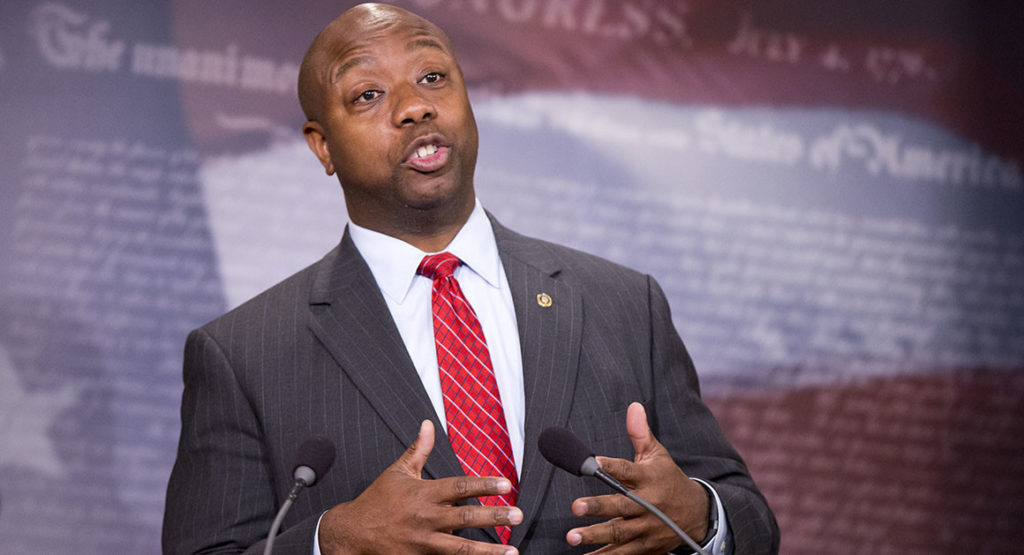
Republican U.S. Sen. Tim Scott of South Carolina, the first African American elected to the U.S. Senate from the South since Reconstruction, will be speaking at an event hosted by Birmingham’s Briarwood Presbyterian Church on July 3. Join us as we welcome guest speaker Tim Scott, U.S. Senator from South Carolina. We’ll also hear and sing songs of faith and freedom, salute the Armed Forces of our country, and honor our active duty military as well as our veterans. Senator Scott is an outspoken Christian who served in the House of Representatives prior to the Senate. His story is an outstanding example of the American Dream realized through hard work and dedication to principles. Senator Scott is an unbridled optimist, and believes that despite our current challenges, our nation’s brightest days are ahead of us. You won’t want to miss his inspirational message. There is no admission charge to this service, and all are invited.
Email insights: It’s a big day for Marco Rubio and Tim Scott
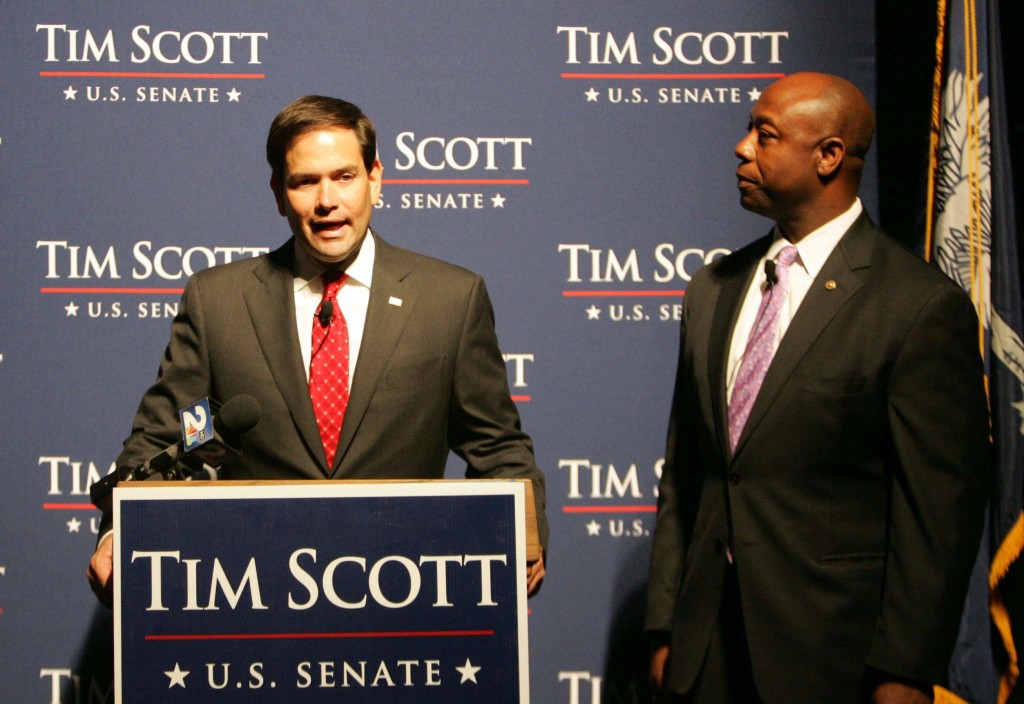
Today’s the big day in South Carolina for Tim Scott, one of two African-Americans in the U.S. Senate. Scott is also a recent convert to Marco Rubio’s presidential campaign. A new primary-day email fundraising pitch tells how Scott, with his “friend Trey Gowdy,” spent the past couple weeks crisscrossing the state to campaign for Rubio, whom Scott calls “the man who needs to be the next president of the United States.” South Carolina is only the beginning, Scott says, and the race is far from over. “In fact,” he writes, “it’s really just a minor skirmish compared with what’s to come.” An even bigger day comes March 1, and with more in next couple weeks after that. “Marco’s going to need a huge amount of resources to build up his national campaign — that’s why we’ve set an ambitious goal of raising $300,000 by the time the polls close tonight.” Who can argue with ambition, especially on primary day? Scott adds that not only is Rubio a “good friend and would make an awesome president,” but the stakes “couldn’t be higher” in 2016. “After two terms of President Obama, we need a conservative Republican nominee who has a vision for restoring the American Dream that’s defined my life, and Marco’s,” Scott says. “Will you go here to help make sure Marco gets to be that candidate?” Primary votes may be one thing, but cold hard cash is quite another. Scott’s support is no small feat; he is the first black Republican to serve in the U.S. Senate from the former Confederate States since Reconstruction. Scott’s endorsement, along with that of Gov. Nikki Haley, provides an essential sign of GOP diversity in a state with a large African-American population. “Make no mistake: This is a big endorsement for Rubio. Scott is very popular in South Carolina,” CNN had reported February 1. “Scott held town halls with every candidate in the lead-up to the primaries, and maintained an unbiased position on all of them.” Material from The Associated Press was used in this report.


